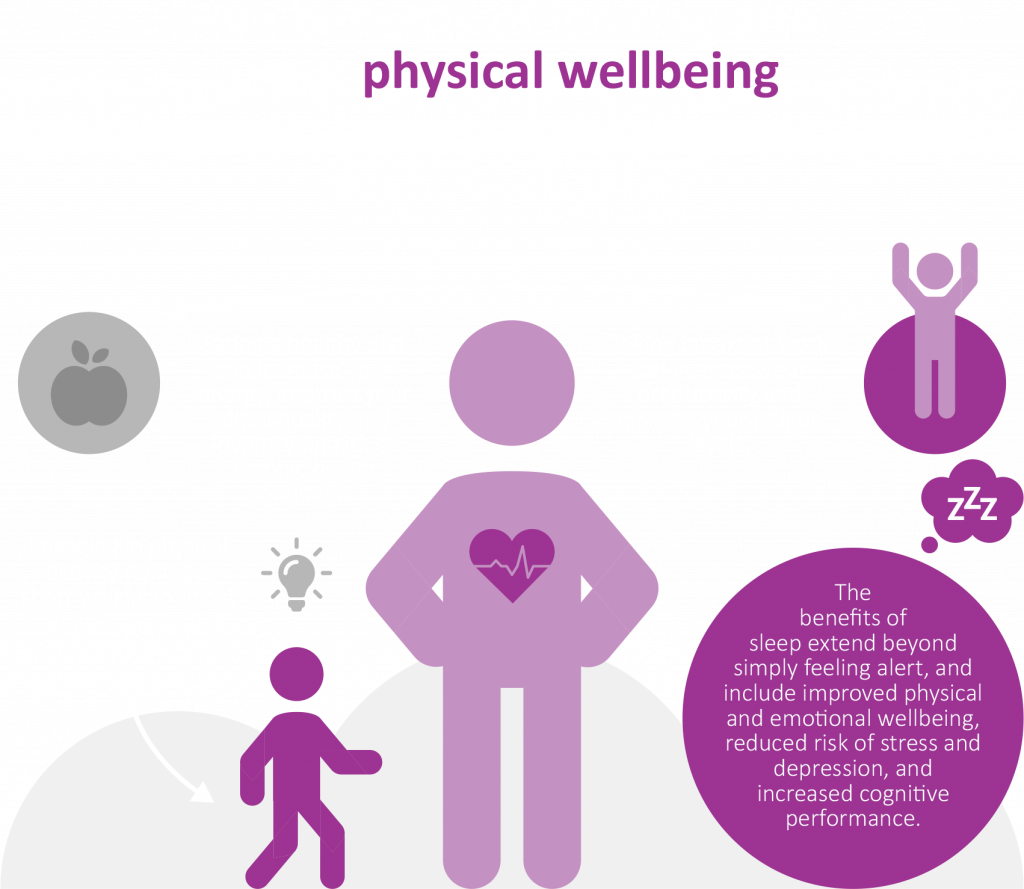Physical wellbeing is one of the most important dimensions of wellbeing. Without physical wellbeing we struggle to perform our daily tasks and activities.
Physical wellbeing is associated with the extent to which we feel physically safe and healthy, and includes:
- nutrition
- rest and recharge
- sleep
- physical activity
- preventative health care
- security
DID YOU KNOW?
Experts recommend that adults should get between 7 and 9 hours of sleep every night.

Where can I start?
-
Schedule regular medical check-ups
-
Preventative medical health care is vital to our physical wellbeing. Ensure you schedule medical reviews annually with your general practitioner.
-
Reduce alcohol consumption
-
It is important to recognise that there are a number of factors that influence how alcohol affects you, including: gender, age, mental health, medical conditions, and drug use. To reduce your alcohol consumption, try to:
- set limits and stick to them
- alternate alcoholic with non-alcoholic drinks
- choose drinks with a lower alcohol content.
-
Improve sleep quality and quantity
-
The best way to ensure you get a good night sleep is to:
- switch off electronic devices at least 30 minutes prior to going to bed
- establish a regular routine – get up and go to bed at the same time
- avoid eating heavy meals or exercising within three hours of going to bed.
-
Improve nutrition
-
The brain thrives best when we provide it with the nutrition and hydration it needs. Try to:
- drink at least 8 glasses of water every day (remember that coffee, tea, and soft drinks don’t count)
- eat 2 serves of fruit and 5 serves of vegetables daily
- plan your meals to reduce the temptation of eating unhealthy snacks.
-
Participate in regular physical activity
-
Physical activity is not just about going to the gym and doing push-ups. Try building more physical activity into your daily life.
- Take the stairs when you can.
- Switch off the TV and go for a walk.
- Set a timer and make sure you get up from your desk every 60 minutes to stretch.
-
Get adequate rest and recharge
-
Take regular breaks throughout the day. Breaks are important to ensure we perform at our best and reduce the risk of burnout. To ensure you get adequate rest and recharge:
- Monitor your energy levels throughout the day. Identify the times you feel alert and awake and the times where your energy levels are low and your concentration is waning.
- Take regular breaks, at least every 90 minutes throughout your day.
- Make sure you take your leave entitlements. Taking your leave entitlements can reduce stress, improve your mood and increase your work productivity.
Note: Breaks can be as short as 1 minute (micro-breaks). Try taking a short walk, stretching, or eating a healthy snack.
For more information
-
Resources
-
Resource Name Source Summary Deep Sleep
(App. Fee applies – for IOS and Android devices)Andrew Johnson Clinical hypnotherapist, Scotland This app provides guided meditation to help you overcome insomnia and get to sleep. Rated as one of the best 10 mental health apps by Medibank. Active Living Heart Foundation A range of resources to help you get active. Healthy Eating Heart Foundation Information and advice on food and nutrition, food labels and healthy recipes. Cycling and Walking Paths (Darwin) City of Darwin Cycling and walking paths in Darwin for short or long breaks. Nutrition Northern Territory Government Directory of available healthy eating resources for self and schools. FoodSwitch
(Web application and free app - IOS and Android devices)The George Institute for Global Health Scan barcodes of packaged foods with your camera to see what is in the food you are eating. Similar foods that are healthier will be illustrated. Handy filters include SaltSwitch, GlutenSwitch, FatSwitch, EnergySwitch, and SugarSwitch. Focus Keeper Free: Work and Study Timer
(Free app available on IOS devices only)Limepresso Timer to help keep your productivity high and avoid burnout. Options to schedule focus periods and short and long breaks.
What to look out for
-
Getting carried away
-
Getting carried away with your physical wellbeing and neglecting the other dimensions.
It is important for our overall wellbeing that our physical wellbeing dimension is not at the cost of other dimensions. Too much of anything can be a bad thing.
-
Fad diets
-
Avoid fad diets to try to get your nutrition on track
The healthiest way to make long lasting change is to make sustainable lifestyle choices.
-
The wellbeing of those around you
-
Your physical wellbeing cannot be at the expense of the wellbeing of others.
Sometimes exercising all weekend can be great for ourselves, but comes at a cost to those around us. Be mindful of how your commitments impact on the wellbeing of others.
References
-
Show
-
- Penedo, F. J., & Dahn, J. R. (2005). Exercise and well-being: a review of mental and physical health benefits associated with physical activity. Current Opinion in Psychiatry, 18.2, 189-193.
- University of Nottingham (2023). Eat Well. Retrieved on 11th December, 2023 from HealthyU > Eat well.
